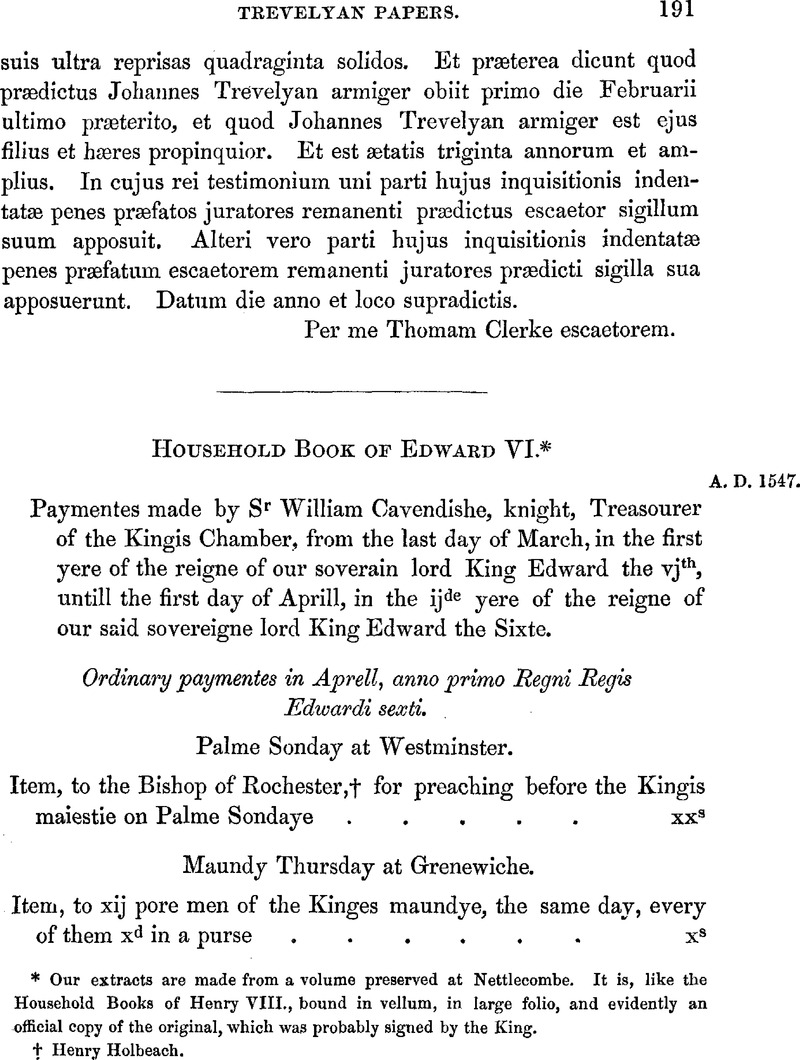No CrossRef data available.

page 191 note † Henry Holbeach.
page 192 note * This entry is repeated monthly.
page 192 note † The occurrence of the name William Camden in this entry is all that is worthy of notice in it; it is frequently repeated. He was probably no relation of Clarenceux.
page 193 note * The father of Lord Burghley, Lord Treasurer to Queen Elizabeth.
page 193 note † This sum used formerly to be paid to Lord Rocheford, when Thomas Boleyne, as Master of the Buekhounds.
page 195 note * Sometimes he is designated yeoman. See Cunningham's Extracts from the Accounts of the Revels, Introd. xviii.
page 195 note † Sic, but probably fee was omitted by the copyist.
page 196 note * His regular pension seems to have been 300 crowns per annum.
page 196 note † It is remarkable how many foreigners, and nearly of all European nations, were entertained by Edward VI. in the very opening of his reign.
page 196 note ‡ Nil, and nil ut supra, is the usual conclusion of this entry.
page 198 note * These were singing-men temp. Henry VIII. and their names are continued in the accounts of his son, although they have not been introduced before in this transcript.
page 198 note † This seems to be the first appointment and payment of Makerith. Besides him we see that the King had two physicians, six surgeons, and three apothecaries. See below the appointment of another surgeon.
page 198 note ‡ Forest makes the eighth surgeon of the Court.
page 199 note * In addition to Kent and Bowde, who were paid only xvs. each.
page 200 note * Probably for some extraordinary services by these Italian musicians, they were paid 8d. a day, besides their ordinary 12d. a day, for nine months. They were all players on what was then called “the viall.”
page 200 note † Elsewhere we have seen him called “yeoman,” or with no addition ; here, for the first time, “gentleman;” and on p. 204 he is called “waiter.”
page 201 note * Here for the first time we find the father of Lord Burghley styled “Mr.”: not so Sternolde, who receives the same gratuity.
page 201 note † These are the old minstrels, paid by Henry VIII. and called his minstrels: how had they been with Edward VI. when prince, and why were they now called “the King's new minstrels “?
page 201 note ‡ Of Bower we have not before heard as master of the children of the chapel.
page 201 note § We have no means of knowing who were the new and who the old vialls; the new seem to have obtained a very disproportionate gratuity. Were the “new vialls “the six who had been paid last month 8d. per day, besides the usual 12d. per day ?
page 201 note ║ Sic.
page 201 note ¶ These, of course, were foreign performers.
page 201 note ** This was a third set of minstrels.
page 201 note †† These were the only four servants who obtained so high a reward. The preceding entry is the first time the Princess Elizabeth has been named.
page 201 note ‡‡ Another reward of xs. is given to “Mrs. Penn's servant.”
page 202 note * This is the first time he has been called Sir Richard in these accounts, and it was not long before his death.
page 202 note † It does not appear whether Mondy filled any office. Was he related to Anthony Monday, the poet and dramatist ?
page 202 note † This was to the printer himself, not to his servant, as in the case of Berthelet.
page 202 note § Meaning Reginald Wolf.
page 202 note ║ It appears elsewhere that “Mr. William Sembarbe (or St. Barbe) was grome of the prevy chamber,” and he had a reward of ids. on New Year's Day.
page 203 note * This entry accounts for the several statements of nil against the memoranda relating to privy alms of Edward VI. in the months above named. There were besides weekly alms distributed, and charged by Dr. Cox at the sum of 49l. 5s. 10d.
page 203 note † The Lord Admiral was, of course, the Protector's brother.
page 203 note ‡ The other preachers this month were Theodore Basill, Mr. Ayer, and “Maister Latymer,” each paid 20s.
page 203 note § The name of Anthony Toto is omitted, but it occurs again on p. 205.
page 205 note * Also payments, as usual, to the two Interlude players, to John Heywood, to Nicholas Steward, to John Belmaine, and Nicholas Bacon.
page 205 note † This name is new, at least in this capacity.